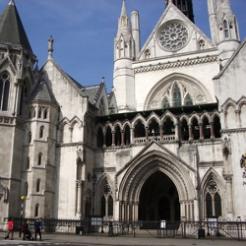The Gambling Commission told the government that the Health Lottery was on the “borders of technical legality” before its launch, the lawyer representing the operator of the National Lottery told the High Court yesterday.
And the Commission itself has made a “legally bad” decision in not ordering a wholesale review of the Health Lottery’s operations, Camelot claims.
Camelot made the points in the High Court yesterday as part of its application for a judicial review of the Gambling Commission’s licensing of the Health Lottery, which launched in October last year.
But counsel for the Gambling Commission, James Goudie QC, characterised Camelot’s position as “the same old discredited case”. He said it was not the responsibility of the Gambling Commission to protect the National Lottery’s market position.
“This has, throughout, been grossly overblown litigation. Preposterously so,” he said.
Lord Pannick QC, acting on behalf of Camelot, outlined most of the company’s claim against the Gambling Commission, which was amended only days ago following the Commission’s decision last month to open a review into the Health Lottery’s marketing and promotion. Both the Health Lottery and the 51 community interest companies (societies) which employ the Health Lottery as an external lottery manager opposed the consideration of the amended claim, but the judges allowed it. The original claim was that the Gambling Commission was wrong in not instigating a review of the Health Lottery operations, but Camelot now claims that the present review does not go far enough.
Goudie said that even with the amendment, the claim against the regulator is out of time. “Whatever the form my learned friend puts it, it remains a challenge to the September 2010 decision [to license the Health Lottery], in which case it’s out of time,” he said.
Lord Pannick was due to address the issue of the delay of the case this morning.
The structure of the Health Lottery is complex. Law allows for society lotteries to turn over £10m a year, with a minimum 20 per cent payout to good causes. The Health Lottery works as an external lottery manager for 51 societies. Players can buy lottery tickets from anywhere in the country, but in any given week one or two region-based societies will benefit from the proceeds (these are identified on the tickets themselves). The charitable money is paid into the People’s Health Trust which distributes it as grants to health projects in the regions designated to benefit from that week’s draw.
Outlining his case yesterday Lord Pannick alleged: “It is plain from the material that the Commissioner has had – and continues to have – concerns about the legality of the [Health Lottery] scheme.”
He claimed the decision to hold a review into only the marketing and promotion of the Health Lottery “makes no sense” and that the Commission has used a “legally bad” reason for not conducting a wholesale statutory review. According to communications presented by Lord Pannick, the Gambling Commission considered it outside its remit to protect the National Lottery and suggested that the government should intervene if it wanted to.
'Commission must uphold rules made by Parliament'
“Of course it’s not the role of the Gambling Commission to protect Camelot, but it is its role to uphold the fundamental limits on society lotteries that Parliament has seen fit to impose,” said Lord Pannick.
The other tenets of the Camelot argument are that the Commission has failed to resolve “its own fundamental concerns” about whether the 51 CICs operate independently of each other and the Health Lottery, and the allegation that the CICs were set up for the Health Lottery, and not vice versa.
Lord Pannick quoted communications from Gambling Commission chief executive Jenny Williams to the Department for Culture Media and Sport dating back to before the Health Lottery’s launch, in which she said that the Commission expected the Lottery to be on the “borders of technical legality” at launch. She also told the Department it needed to decide whether to close the “loophole” which allows the Lottery to operate at a national level.
The Gambling Commission and Health Lottery are expected to make their submissions to the court today.
The hearing is expected to run until tomorrow.








